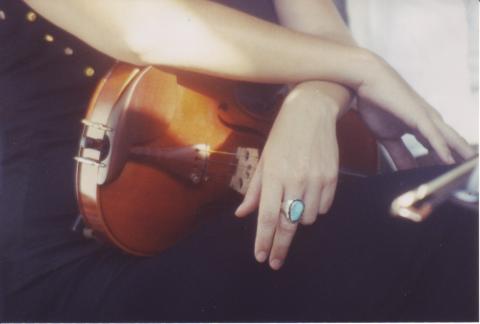I never met Danielle Legros Georges, though we had corresponded and I sent her poems, including a sequence written after the disastrous earthquake in Haiti in 2020; the first poem of that cycle is reproduced here. We shared a common Kwéyòl heritage—she from Haiti, me from Saint Lucia—so it seemed right to include and begin with this poem about Haiti, to celebrate her.
Her passing so soon from us, with her talent and dedication to the arts, literature and our shared Caribbean bilingual culture, tinges and colors the tone of the poems I offer to her in these pages.
Maman
A Cycle for Danielle Legros Georges
In Memoriam, 1964–2025

Image: Turquoise.
Photograph by John Robert Lee; used by permission of the author.
i. Maman—January 12th, 2020, Haiti
Did you find him, maman, the old man,
or was it the grandchild left in your care for the day,
or, in the catastrophe behind you,
the daughter who was setting your supper,
or perhaps your friend, having a Dominican ponche with you?
Your long arms, maman, are bathed in the white dust of disastrous city-fall,
your fingers are exhausted from their frantic and futile search for bones,
for hair, for a belt or a bodice,
for a baby, a baby who was impossibly there,
gurgling at her spoon
teasing your heart,
and you singing a lullaby, “Haiti Cherie,”
Haiti beloved, beloved child,
gone child, gone with the walls, the debris, the tranblanterre and the
lavalas,
gone from your arms, from your keening, scrabbling fingers
despairing under block, under board, under broken back,
and the child disparu, taken—
Or was it your friend from Cap Haitien,
or the daughter who shared your name,
or the old man—companion of your days,
comrade of sleepless hours, keeper of your young heart,
comforter of those fallen breasts/
fallen under your torn chemise/
fallen with the roofs and the windows and the President’s house/
fallen with the broken routes of Port-au-Prince/
fallen and forlorn, Haiti Cherie?
ii. Intimacies
Intimacies of affection lie
like browning masks of leaves
in the overgrown garden,
like prostrate fallen trees in their
common desolation of tattered costumes,
like deep space between bright aligned planets—
infinity of distractions: online
chatter, haunting past,
anxieties conjured, boredom
with the faithful familiar,
the predictable kind hand—
and frequently now: troubling, final departures.
iii. “Where will we go?” (Koffee – Lockdown)
through night’s echoing hall
a soundsystem feeds that haunting
reggae lyric reverbing off cool air
and insect symphonies
into the insomniac fretting
of your discordant apprehensions—
edging apocalypse, theocracies gather
burning crosses, pyres
of banned books;
mass shootings and gang vendettas
proliferate, corporations as always grow profit—
closer to your tossing heart, alarming obituaries multiply.
iv. Presence
We take presence for granted
until boys diving off the pier
are gone forever, the kitten fallen
through a window never
returns, that nearby chair
retreats steadily under its vacant cushion . . .
loss comes like
apocalypse, without explanation from
the dove on the line looking in,
the dog haranguing night noises,
the pineapple in its long-eared thorns,
the concordance of your unceasing incomprehensions—
maybe absence is the certain
apotheosis of presence,
a pointillist puzzle
curving around spaces
of mysterious design,
a signal to the numinous,
for you shifting under
the burdening of questionings
that resound in the echo-chambers
of nagging despair,
that haunt the corners of eyes
inundated by presentiments of ghosts . . .
v. Terminus
“. . . . . life exhausted
intimacy’s equations” —Dionne Brand
as in the frieze-indented rubble
of ancient Mayan cities under
rain forests, with plazas, ball courts,
causeways, burial caves
and pyramids,
sacred solar calendars, seasonal lives,
before the deep-state cartels of Spain
arrived, and poles shifted
catastrophically—
as in the broken, holy shape
of a blue butterfly
on a secular sidewalk,
and suddenly, a cold draft
of air stabs through the leaning fence
where a small bird sees you
place the blue butterfly in nearby grass
tentatively—
and as in watching grey-headed musicians
perform reggae hits you loved
and still remember every word intimately,
now bereft, somewhat, of those first
excitements, that revolutionary fervor,
the “abracadabra” fleetness of foot—
and you glimpse—Mayan, blue butterfly, reggae—your free-falling to the eclipse of
shadows.
John Robert Lee is a Saint Lucian writer. His latest publication is After poems, psalms (Peepal Tree Press, 2025). The first sequence in this cycle, “Maman–January 12th, 2020, Haiti” is published in his Collected Poems (Peepal Tree, 2017; used with permission). The other poems come from “Diary,” a new unpublished manuscript.